June 14, 2022
![]() 10 mins Read
10 mins Read
It’s been some time since I’ve clambered onboard a wine bus and ticked off cellar doors one after another. In more recent times, I’ve favoured wine-paired degustations stretching across languorous afternoons at fancy winery restaurants. Either way, the resulting buzz is sometimes not all that dissimilar. Enter WA’s lengthy border closures and a time of unexpected stillness and reflection that, as for many Australians, shifted my priorities. During the slow-down, I noticed nature’s seasons like never before and thought deeply about my impact on the Earth – and my own body. Coming out the other side, I’m no longer interested in unnecessary excess. Instead, I’m pursuing conscious escapes where I rest, revive and reconnect with nature, and my clear-eyed self.
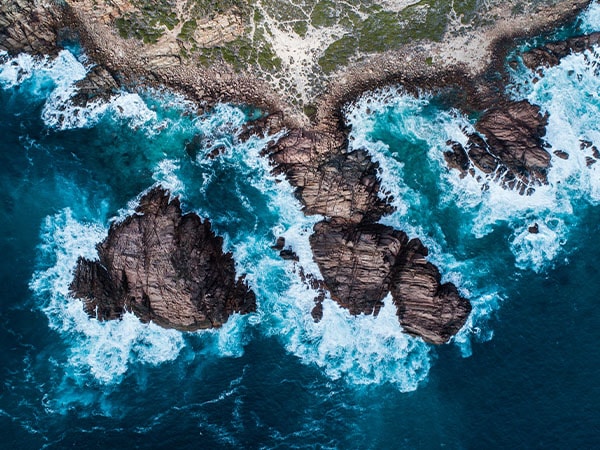
See the dramatic view over Sugarloaf Rock in the Margaret River Region. (Image: Tourism Western Australia)
You could be forgiven for assuming that the Margaret River Region’s glamorous reputation and weekend hotspot status means there’s little room for green leanings. But beneath the slick surface is a place rife with good-for-the-Earth experiences that go well beyond brown-paper menus. Think forested e-bike roams between vineyards, off-grid dining experiences where food waste goes to the pigs (who later end up on the plate), and starlit bush walks to commune with endangered native species.
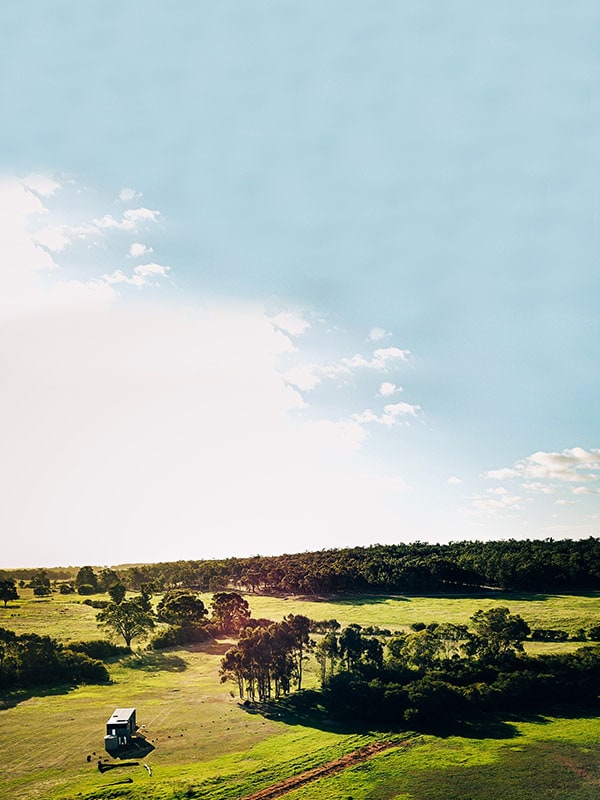
It’s easy being green in the Shire of Augusta-Margaret River, recently recognised as an accredited Eco Destination.
This World Environment Day saw the Shire of Augusta-Margaret River awarded ECO Destination Certification, one of only a handful of Australian destinations to satisfy the scrutiny of Ecotourism Australia’s application and auditing process. The move solidifies the coast-hugging region’s long-held, yet little-known passion for sustainable and nature-based tourism. The South West is also one of only two global biodiversity destinations in Australia. It makes sense then, to travel slowly and thoughtfully here. So let’s hit the road. I opt to do things properly, offsetting my car’s emissions with Aussie carbon credit dealer, GoNeutral before turning the keys and leaving Perth.
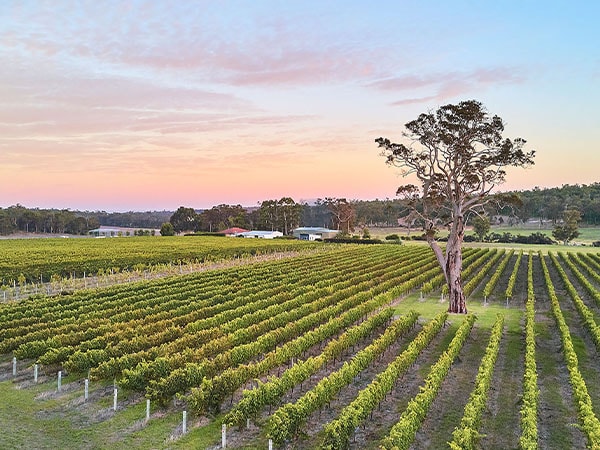
The Wine Sensory Garden is one of the highlights of a visit to the vineyard.
Nearly three hours later, I’m pulling into a vineyard and sheep farm where endangered Carnaby’s black cockatoos teeter on wire fencing, gossiping loudly as I roll by to an off-grid tiny cabin called Joey. It’s stationed in a paddock mobbed with kangaroos – hence the moniker – who provide the evening’s golden light entertainment. Initially with horror, then relief, I discover there’s zero Internet coverage here; I can’t even send an SMS. Proper disconnection washes over me as I slide into bed and gaze out my wall-sized window.
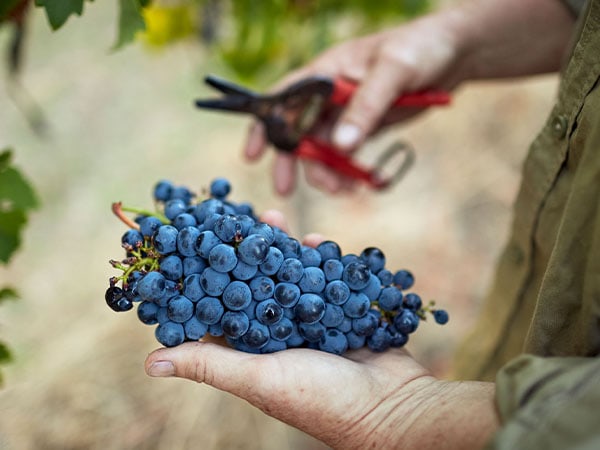
Whicher Ridge harvests grapes from a single vineyard.
I swap my solar-powered haven the following morning for a stroll around a wine sensory garden laid out in the shape of an infinity symbol. Cathy and Neil Howard run Whicher Ridge winery, a five-minute walk from Joey – far enough away for out-of-view seclusion, but close enough for solo me to feel cosily safe. Winemaker Cathy’s fragrant garden is her pride and joy and is riddled with plants that match wine flavours; over the next hour we smell, chew and sip our way through pineapple sage, lemon verbena and orange thyme with samples of small-batch viognier, chardonnay and shiraz in hand.
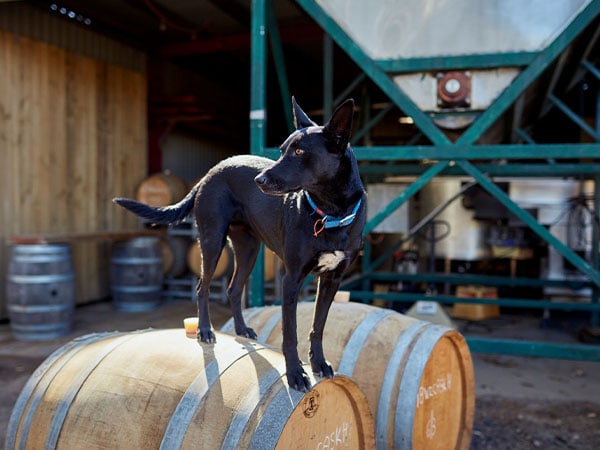
The winery produces small-batch wines under the watchful eye of Polly.
It’s a wine-matching experience unlike any other – indeed, the garden is believed to be the only one of its kind in Australia. “The flavours in wine can be transferred across to plants,” says Cathy, who composts winery waste, stalks and grapes into the grounds. “A sensory experience helps the brain to remember it.”
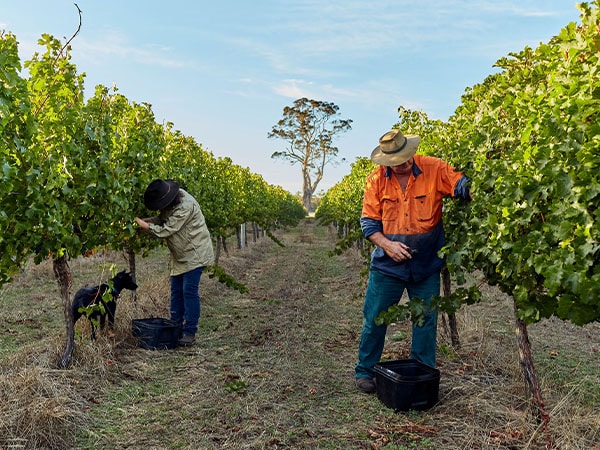
Enjoy a ‘Pick and Sip’ experience with the winemakers at Whicher Ridge.
It’s a worthy primer for the farm tour at Arimia Estate in nearby Wilyabrup. The certified organic, off-grid winery hides down a dirt road, a fitting entry for a property so keenly devoted to sustainability. Its owner, Ann Spencer, is a quietly spoken, no-fuss type who downplays her contribution as we drive around the 55-hectare property in her dusty 4WD. “I like to think I’ve always been mindful of not wanting to destroy the environment or build on wetlands,” she says, pouring out slop buckets of kitchen waste to her rare-breed pigs, who are foraging in the scrub. “Chef uses everything to its utmost and then it goes to this lot. There’s little to no waste from diners.”
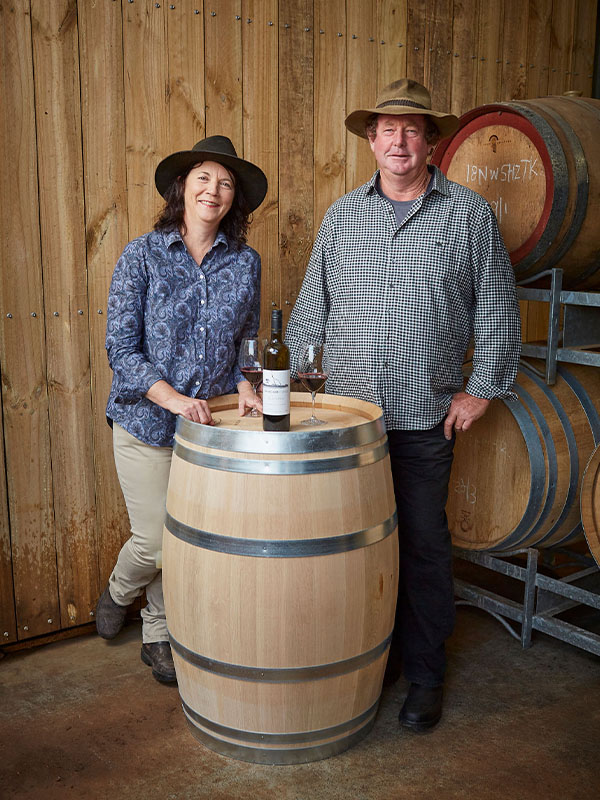
Neil and Cathy Howard, the vigneron and winemaker couple behind Whicher Ridge.
I’m not surprised. After a kitchen garden walk through wicking beds, a worm farm, chicken run, bee-friendly flowering plants and companion-planted heirloom varieties, I sit down to an off-menu lunch that’s one of the most memorable meals I’ve had in years. The restaurant did away with à la carte menus in 2020, instead serving five mystery courses plus snacks and other delights. “It just depends on what produce chef can get his hands on,” says Ann. “Generally, everyone loves the surprise and the experience.”
Chef Evan Hayter is as boots-in as they come. As I dive into ribbons of carrot tartare dressed in smoked trout cream and dotted with ocean trout caviar, he reels off his modus operandi. “We cook with gas, the restaurant is run on solar, and we collect rainwater and process all our own wastewater,” he says. “The only single-use plastic is from our sous vide vacuum bags and I’ve had the same roll of cling wrap for the past five years.”
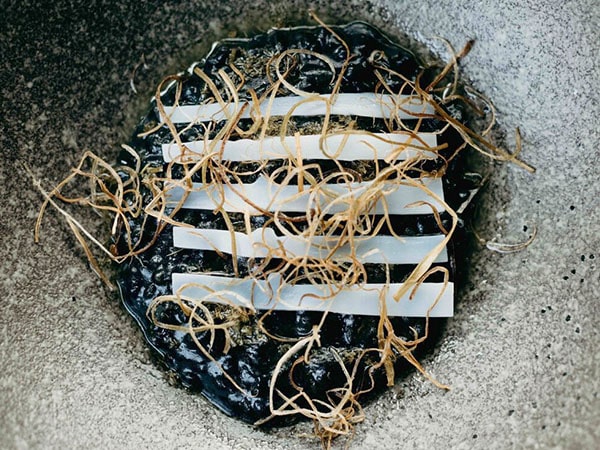
Taste one of chef Evan Hayter’s creations at Arimia Estate.
In keeping with his passion for hyperlocal, Hayter’s father made the restaurant tables and his partner hangs the walls with her art. I plunge a fork into organic flour fettuccine handmade using farm eggs an hour earlier, dredging Exmouth prawns in a saffron and estate olive oil sauce. “The things we do that are standard for us, I don’t see elsewhere,” says Hayter. “I’ve even stopped using the term sustainable. We just do it. The world needs us to do it.”
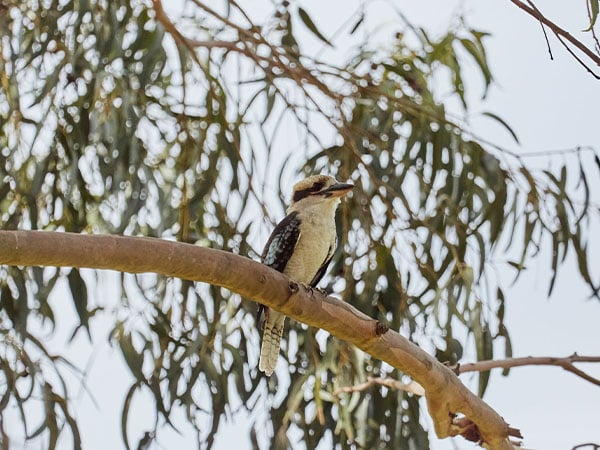
Whicher Ridge is a haven for local birds and wildlife.
I return to my tranquil tiny cabin with plenty to think about. Sitting alone around a flickering fire pit, I scribble a list of what more I can do to lighten my earthly footprint as kangaroos tussle in distant yellow grasses. Who needs Netflix when this is the nightly show?
The following day heralds a winery tour unlike any other I’ve done. Forget the branded mini bus: this one’s via electric mountain bike, combining eco credentials with ease of movement along the area’s forest-fringed back tracks. Jodie Berry from Easy Ride Tours leads me along the waterway of Margaret River, so-named by settler John Bussell after the step-second-cousin he’d fallen in love with. To the Wadandi Noongar people, it’s known as Wooditchup, evoking the magic man, Wooditch, who created the river.
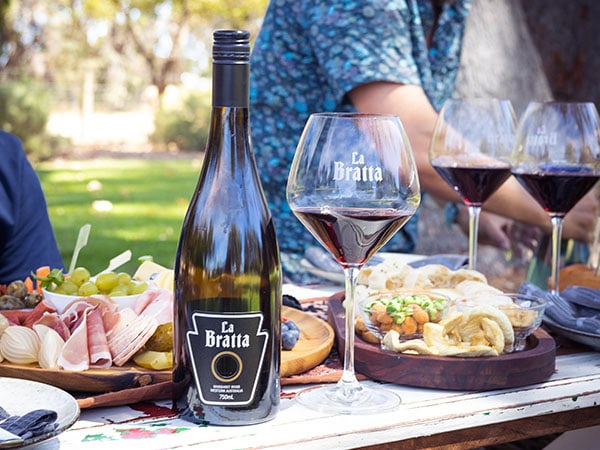
Pause for a picnic while on an e-bike excursion with Easy Ride Tours.
The crunch of dry leaves under our bicycle treads is met with a symphony of native birdsong and that fragrant, sweet blend of bush perfume. We hit the skids at Stella Bella winery, a place of minimal intervention winemaking and organic fertiliser use, before pedalling the Wadandi Track to Arlewood Estate, a micro cellar door open just three days a week.
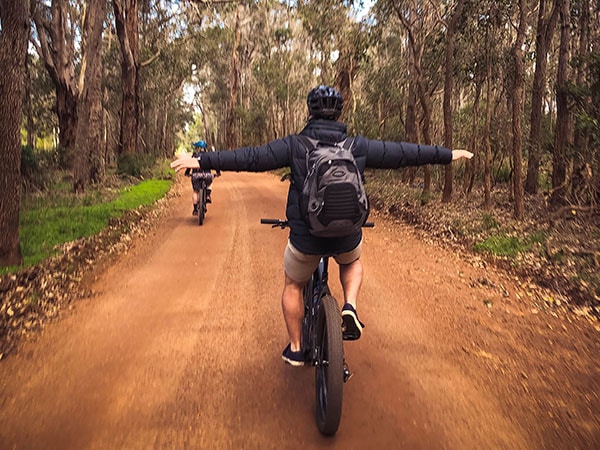
Experience the magic of Margaret River while rolling through the region.
While pairing a sem-sav-blanc-chardonnay blend with chocolate squares infused with chipotle, hazelnut and dried apricot (that’s a tasting experience worth cycling for), I hear that weed-munching sheep mow between the vines, ruling out the need for herbicide. “We have a less-is-more approach to sprays, especially because of the sheep,” says cellar door host, Paris Hokin.
The light-dappled route back to town sees our solar-charged bikes clock up 32 kilometres, with an average speed of 17 kilometres per hour. It’s definitely enough to earn us a beer at Margaret River Brewhouse. As well as supplying brewing mash to local farmers for cattle feed, this watering hole donates $1 from select beers towards a range of nature-based and community causes. Popular drops include the Possum Ale, Plover Pale, a German-style Kolsch lager and a Hazy IPA dubbed In the Pines.
The western ringtail possum the brewhouse supports is rarely seen. It, and the area’s other elusive marsupial, the woylie (or brush-tailed bettong), are both critically endangered. With hopes of observing these shy creatures, I join South West Eco Discoveries’ nocturnal animal tour. Brothers Ryan and Mick White drive me to a privately owned nature sanctuary where an electric gate slides to let us in and keep predatory foxes out. At first, we’re mobbed by western grey kangaroos eager for feed pellets, and I recoil at what seems like a tourist trap. But as night falls, things turn authentic.
“The woylie only comes out and becomes visible because we put food out,” says Ryan, acknowledging things can feel staged at first. “Perth Zoo advises us on feed, and these woylies are from the Perth Zoo breeding program.” The critters are known to spread native fungal spores – vital for a healthy ecology. “Science suggests these fungi are how forests communicate, so they play an important role” says Ryan. As we make to leave, a rustle from above alerts us to other guests: ringtails. It’s like winning nature’s lottery, and we watch in silent awe.
This trip closes so differently to my usual wine weekends. There isn’t any gregarious behaviour guilt, nor do I feel righteous. I just feel at peace. I’ve found my new way.
Continue the deep dive into the Margaret River Region’s sustainable side with these eco-conscious operators:
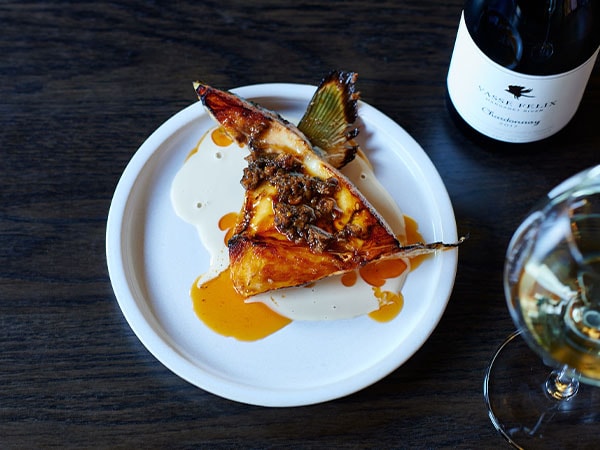
Indulge in regional flavours at Vasse Felix Restaurant. (Image: Tourism Western Australia)
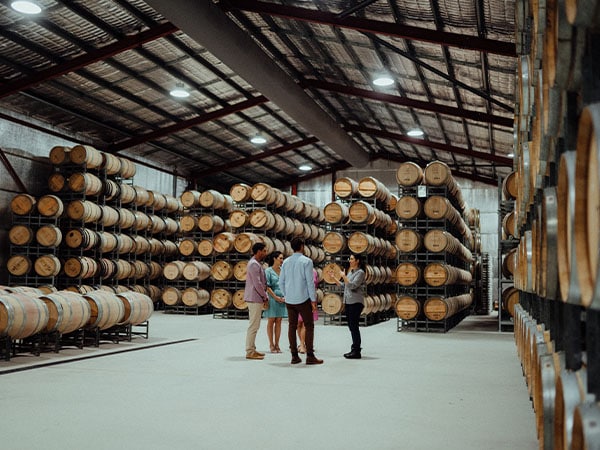
Tour Voyager Estate. (Image: Tourism Western Australia)
The Margaret River Region is an easy three-hour drive south of Perth, or you can fly to Busselton airport and hire a car or driver. Since April, lucky Melburnians have been able to fly direct with Jetstar, which is running a three-year trial of the route.
For a slice of seclusion, book into Heyscape’s tiny cabins at a secret winery location on Busselton’s outskirts.
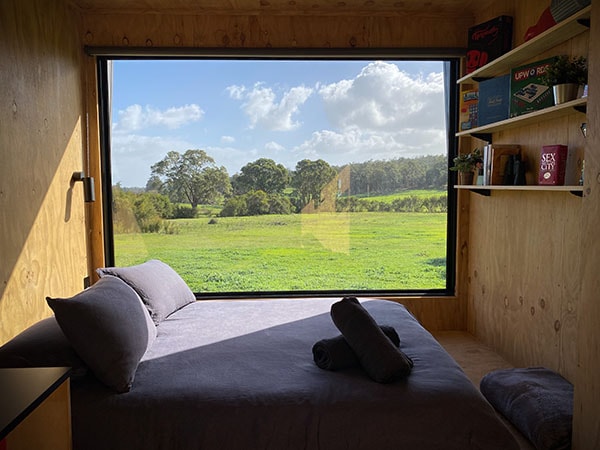
Book into Heyscape’s tiny cabins.
Consciously consume off-menu at Arimia Estate in Wilyabrup.
Pedal effortlessly through forest to sustainable cellar doors with Easy Ride Tours’ e-bikes, kicking off from Margaret River town. Watch for woylies on a night walk led by South West Eco Discoveries.
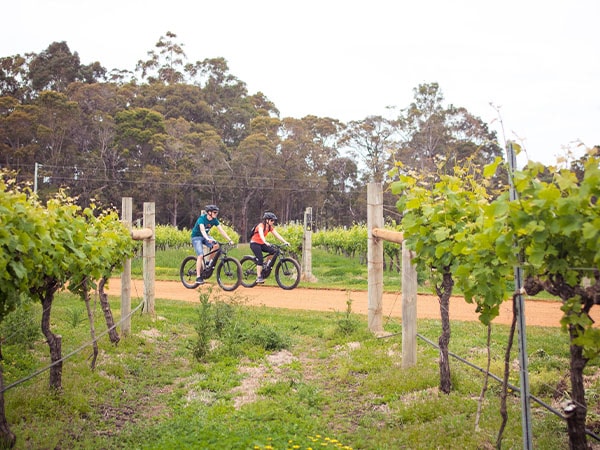
Pedal effortlessly through forest to sustainable cellar doors.
For the  best travel inspiration delivered straight to your door.
best travel inspiration delivered straight to your door.
LEAVE YOUR COMMENT